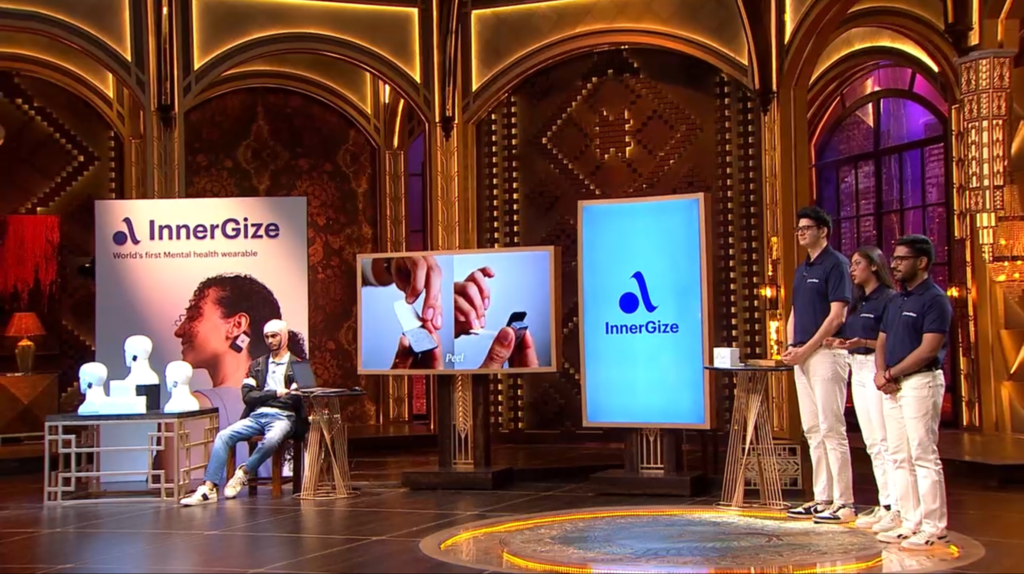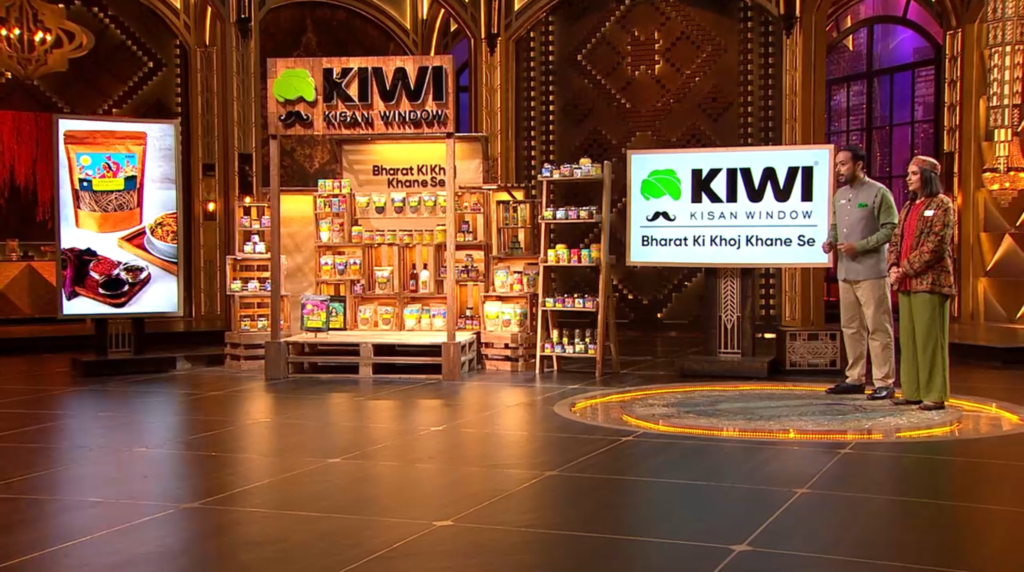InnerGize Shark Tank India Season4 Episode5 Pitch1
InnerGize is a mental health wearable that has been clinically tested. It helps relieve stress quickly in the short term and also helps the body handle stress better over time. The founders asked for ₹54 Lakhs for 1.5% equity, which values the company at ₹36 Crores.
The InnerGize device is placed behind the ear. To use it, you simply peel the sticker, place the device behind your ear, and control it through an app. The device sends gentle electrical signals to stimulate the vagus nerve. The company has a patent for this technology called Neuro-Acoustic Vagal Modulation.
InnerGize can be used anytime and anywhere. The device has been tested on over 1,100 people, and the results have been positive. The founders mentioned that the device is approved by psychiatrists, psychologists, and neurologists. It is now ready to be launched in the market.
InnerGize helps build stress resilience by training the vagus nerve to activate the parasympathetic nervous system. The company recommends using the device for 2-4 sessions of 10 minutes each day. The device has been tested for the past 12 months. The founders also mentioned that the device is 100% safe, as vagus nerve stimulation has been used for over 30 years.
| Release Date | 10 January 2025 |
| Founder | Dr. Siddharth Bhargava, Shalmali Kadu, and Mitansh Khurana |
| Business | Stress relieve device |
| Ask | ₹54 Lakhs for 2% Equity |
| Valuation/ Networth | ₹36 Crores |
| Funding | ₹1 Crore for 4.2% Equity |
| Sharks | Aman Gupta, Ritesh Agarwal & Azhar Iqubal |
| Episode | 5 |
InnerGize Financials during Shark Tank India?
The three co-founders each own 33% of InnerGize. The company has raised a total of ₹2 Crores, with ₹90 Lakhs coming from grants. They are currently raising ₹4 Crores in investment, with the company valued at ₹36 Crores after the investment.
The founders plan to build a Direct-to-Consumer (D2C) brand in the future, but for the first 6-8 months, they are focusing on Business-to-Business (B2B) sales. The product is priced at ₹5,000, which includes the device, charger, and 12 patches. They also sell a set of 8 patches for ₹500. The manufacturing cost for the product is ₹1,200.
For the B2B model, the company wants to become a mental health partner for businesses and offer services on a pay-per-session basis. Once customers are familiar with the benefits, they plan to sell the devices to them directly.
InnerGize Shark Tank India Deals Discussion:
Ritesh was the first shark to make an offer, giving InnerGize exactly what they asked for. Kunal felt it was too early for an investment, so he decided to go out. Vineeta also thought it was too soon and went out as well. Aman offered ₹54 Lakhs for 2.5% of the company, valuing it at ₹21.6 Crores. Azhar also made an offer of ₹54 Lakhs for 1.5%.
The founders took some time to discuss the offers. During that time, all three interested sharks joined forces and offered ₹75 Lakhs for 3% of the company. The founders countered with ₹1.08 Crores for 3% equity. After some negotiations, they all agreed on a ₹23.81 Crore valuation, with the three sharks together investing ₹1 Crore for 4.2% equity.
Founder of InnerGize
Dr. Siddharth Bhargava, Shalmali Kadu, and Mitansh Khurana are the founders of InnerGize. Dr. Siddharth grew up in Mumbai and completed his MBBS in 2017. After that, he started his first business, Food Darzee, which delivers healthy food.
Personal Touch Shark Tank India Season4 Episode5 Pitch2
Personal Touch Skincare is a brand that focuses on lifestyle skincare. It appeared on Shark Tank India Season 4. The company offers products in skincare, body care, and home care. They combine effective clinical ingredients with affordable luxury. The founders asked for an investment of ₹1.2 Crores for 1% equity, valuing the brand at ₹120 Crores.
Personal Touch Skincare addresses specific skin concerns for Indian skin tones, such as hyperpigmentation, acne, psoriasis, and aging. They use high-quality, science-backed ingredients in their products. The founders mentioned that their unique formulas are difficult to copy. The brand caters to both men and women, and their products work equally well for men’s skin.
| Release Date | 10 January 2025 |
| Founder | Ashish Jawa & Aditi Jawa |
| Business | Skincare |
| Ask | ₹1.2 Crores for 1% Equity |
| Valuation/ Networth | ₹120 Crores |
| Funding | No Deal |
| Sharks | No Deal |
| Episode | 5 |
Personal Touch Financials during Shark Tank India?
Personal Touch Skincare products are sold on popular online marketplaces in India, such as Nykaa, Amazon, and Flipkart. In just two years, the company has sold 7 lakh units and has a customer retention rate of 57%. They offer 38 different products, with their top three sellers being face bath, mucin moist serum, and youth burst moisturizer. These three products make up more than 50% of their total revenue.
The company started in 2022. One of their products, “Not Just SPF” sunscreen, contains snail mucin, hyaluronic acid, and ceramides, and is priced at ₹1,599. All of their products are made in Baddi, Himachal Pradesh, at the manufacturing unit owned by the founder’s cousin. 94% of their sales are made through their own website.
In FY22-23, the company earned ₹1.53 Crores in revenue. In FY23-24, they earned ₹20.55 Crores in gross revenue and ₹16.18 Crores in net revenue. So far in FY24-25, they have made ₹12 Crores in revenue and are expecting to reach ₹22 Crores in gross revenue and ₹20 Crores in net revenue by the end of the year.
Personal Touch Skincare had an EBITDA of 5.05% in FY23-24 and a profit after tax of 1.54%, which resulted in a profit of around ₹25 lakhs. As of November 2024, they have achieved an EBITDA of 14.52% and realized profits of ₹1.22 Crores. The founders have worked on improving their efficiency, such as reducing the return-to-origin (RTO) rate from 7.5% to 6.16% and optimizing their marketing spend.
In November 2024, the company fulfilled 12,000 orders from their website, generating a gross revenue of ₹1.65 Crores and a net revenue of ₹1.32 Crores. In their first year, they spent 43% of their revenue on marketing, but have since reduced it to under 30%. Most of the marketing budget was used for influencer marketing and building a community.
For their unit economics, the company pays 15% GST on products, 29.3% goes to the cost of goods sold (COGS), 29.61% is spent on marketing, shipping takes 6.62%, and other expenses account for 7.13%. This leaves them with an EBITDA of 12.34%. The average order value for the company is ₹1,450 after discounts.
Personal Touch Shark Tank India Deals Discussion:
Aman was disappointed because the founders didn’t know enough details about their company, so he decided to go out. Kunal left because the company lacked proper branding. Vineeta didn’t trust the numbers the founders gave, so she also went out. Ritesh wanted to help the founders with the details but wasn’t ready to invest. Azhar felt the same way, so he went out as well. In the end, Personal Touch Skincare left Shark Tank without a deal.
Founder of Personal Touch
Ashish Jawa and Aditi Jawa founded Personal Touch Skincare. They are siblings from Panipat. Aditi previously ran a private label that sold customized Indian wear in Panipat.
To Buy the Product Please Click on the Personal Touch Product.
KIWI Kisan Shark Tank India Season4 Episode5 Pitch3
KIWI Kisan Window is a company that offers healthy and unique flavors from India. It appeared on Episode 5 of Shark Tank India Season 4. The company focuses on both in-person experiences and online sales through multiple channels. The founder asked for an investment of ₹50 lakhs for 1% equity in the company, valuing it at ₹50 Crores.
KIWI Kisan Window has 8 retail stores and a website. They have processed over 3 lakh orders so far. The company plans to expand to 300 stores in the next five years. Their business is divided into two parts: one focuses on introducing people to the brand, while the other, which generates most of the revenue, focuses on larger sales.
| Release Date | 10 January 2025 |
| Founder | Abhinav Ahluwalia and Nupur Agarwal |
| Business | Retail |
| Ask | ₹50 Lakhs for 1% Equity |
| Valuation/ Networth | ₹50 Crores |
| Funding | ₹2.5 Crores for 10% Equity |
| Sharks | Kunal Bahl |
| Episode | 5 |
KIWI Kisan Financials during Shark Tank India?
KIWI Kisan Window was started as a private company in 2017. They offer a variety of products, including 150 SKUs of healthy essentials, 50 SKUs of healthy beverages, and 50 SKUs of healthy snacks.
97% of KIWI Kisan Window’s revenue comes from online sales. They only started selling offline in the last quarter, so it contributes a small part to their total revenue. In FY23-24, the company earned ₹5.06 Crores, compared to ₹4.3 Crores in the previous year. By October 2024, they had already made ₹4.5 Crores in revenue for FY24-25 and are expecting to reach ₹10 Crores by the end of the year.
KIWI Kisan Window raised ₹80 lakhs in early 2024, with a company valuation of ₹30 Crores. Their EBITDA last year was 5.3%, up from 4.3% the year before. The founders mentioned that their EBITDA is currently -2%. The company sells a select range of high-margin products on their website.
In terms of expenses, the largest cost is COGS, which is 50%. Salaries take up 22.5%, rentals are 6.5%, marketing is 3%, logistics and electricity each take 2%, maintenance is 3%, and other expenses account for 5.7%. After all these costs, their EBITDA stands at 5.3%.
Each of their stores is about 250 square feet. They pay around ₹45,000 in rent per store, and each store generates ₹9-10 lakhs in revenue. Store sales range from ₹5 lakhs in Mohali to ₹15 lakhs in Dehradun. Out of their 8 stores, 4 are company-owned, and the rest are franchises. The payback period for a store is 18-24 months.
KIWI Kisan Shark Tank India Deals Discussion:
Ritesh went out because the stores’ volume was too low. Vineeta also went out because she felt the numbers didn’t add up. Aman offered ₹50 Lakhs for 2% equity, plus 2% royalties until he recoups ₹1 Crore. Azhar asked if he could join Aman, and Aman agreed.
Kunal was very interested in the business, so he made two offers at the same valuation but without royalties. He offered ₹2.5 Crores for 10% equity or ₹1.25 Crores for 5% equity. Aman and Azhar also removed royalties from their deal.
The founders thought about it and countered Kunal with ₹2.5 Crores for 8.33% equity, valuing the company at ₹30 Crores. They mentioned that this was the same valuation as their previous funding rounds. Kunal didn’t accept the counter, so the founders agreed to Aman’s initial deal. They shook hands on a ₹25 Crore valuation.
Founder of KIWI Kisan
Abhinav Ahluwalia and Nupur Agarwal founded KIWI Kisan Window. They are from Dehradun, Uttarakhand. Nupur completed her undergraduate studies in London.


